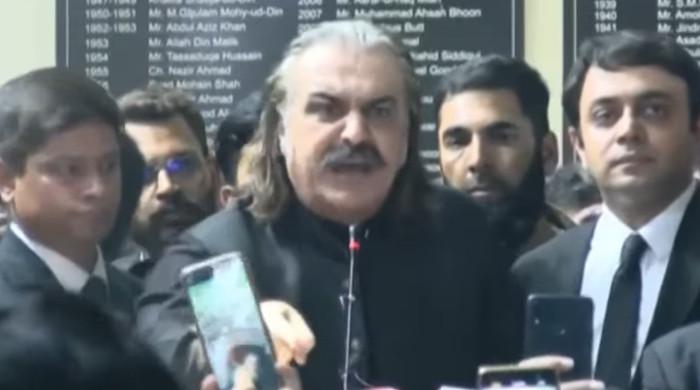PTI files plea in SC to obtain permission for another long march to Islamabad
PTI Secretary-General Asad Umar files plea in SC, interior ministry, Islamabad inspector-general, others named as respondents
June 01, 2022

- PTI seeks Supreme Court order for peaceful protests in Islamabad.
- Petition filed by PTI Secretary-General Asad Umar.
- PTI be allowed to hold peaceful protests and gatherings in Islamabad, petition argues.
ISLAMABAD: Pakistan Tehreek-e-Insaf (PTI) has filed a petition in the Supreme Court seeking permission for a second long march to Islamabad.
The petition, filed by PTI Secretary-General Asad Umar, named the interior ministry, Islamabad inspector-general and others as respondents.
PTI Chairman Imran Khan had abruptly announced the end of his ‘Azadi March’ on March 26 and had given the government a six-day ultimatum to announce a date for a general election. He had later said he called the march off due to fear of bloodshed.
The petition filed in court today argued that the court should order that PTI be allowed to hold peaceful protests and gatherings in Islamabad and no obstacles should be put in the way of PTI protests in any city.
It said the court should order that no PTI worker or leader should be arrested or tortured, intimidating tactics against PTI and raids on houses should not be carried out and the movement of people shouldn’t be stopped.
The petition seeks that the court order that no force be used against the participants in the protest and sit-in.
Former Prime Minister Imran Khan has called for protests in Islamabad in case the government does not announce elections.
PTI's petition
Nine questions have been raised by the PTI in its petition submitted to the SC. They are:
- Whether freedom of movement, and the right to peaceful protest and procession, is a fundamental right of all the citizens of Pakistan, under the Constitution of the Islamic Republic of Pakistan, 1973 (hereinafter the “Constitution”)?
- Whether constitutional rights, enshrined in Articles 4, 5, 8, 9, 10, 14, 15, 16, 17, 19 and 25 of the Constitution, can be unreasonably curtailed by executive authorities, through the use of disproportionate and unlawful force on the peaceful citizenry?
- Whether the fundamental rights, enshrined in Articles 8, 9, 10, 14, 15, 16, 17, 19 and 25 of the Constitution must be respected and protected from unconstitutional and illegal curtailment by the governmental authorities?
- Whether the State and governmental agencies of Pakistan can unlawfully deprive citizens of their liberty, guaranteed under Articles 9 and 10 of the Constitution, by arresting individuals who are participating in, or intend to participate in, a peaceful protest for the attainment of their democratic rights?
- Whether the governmental agencies can, without any cause or reason, browbeat, intimidate, or physically harm individuals and groups who gather for a peaceful procession, thus violating their ‘inviolable’ dignity and privacy of home, as guaranteed under Article 14 of the Constitution?
- Whether the citizens of Pakistan have the right to peacefully enter, move around and remain in various territories of Pakistan, in accordance with Article 15 of the Constitution?
- Whether the citizens have the right to peacefully assemble, protest and hold demonstrations, for the achievement of their democratic demands, in accordance with the letter and spirit of Article 16 of the Constitution?
- Whether the petitioner, a duly registered political party, has the fundamental right to organise, associate and conduct a nationwide political rally, in accordance with Article 17 of the Constitution, without unlawful interference by the federal and provincial government authorities?
- Whether the arrest and detention of members of the petitioner's political party, prior to or during a peacefully organised protest, amount to illegal detention and arrest, as well as a violation of the Petitioner’s rights under Article 17 of the Constitution?
'Govt taking such steps to break the country': Asad Umar
Meanwhile, Asad Umar, while talking to the media outside the apex court, said that the government is taking such steps to break the country. "It wants to create a divide between the Centre and provinces," he said. He went on to say that the party has raised questions related to basic rights provided in the Constitution of Pakistan.
He asked which law restricts the citizens from staging a peaceful protest.
The politician said that the incumbent government raided the house of Allama Iqbal's daughter-in-law, Justice (retd) Nasira Iqbal while thousands of PTI workers were arrested before the 'Azadi March'.
He said that protesters coming from the entire country were stopped from marching toward the capital city.
"Hundreds of thousands of people took to the streets despite government's worst violence," he said.
Umar said that PTI has filed the plea to seek permission for another march in advance.











